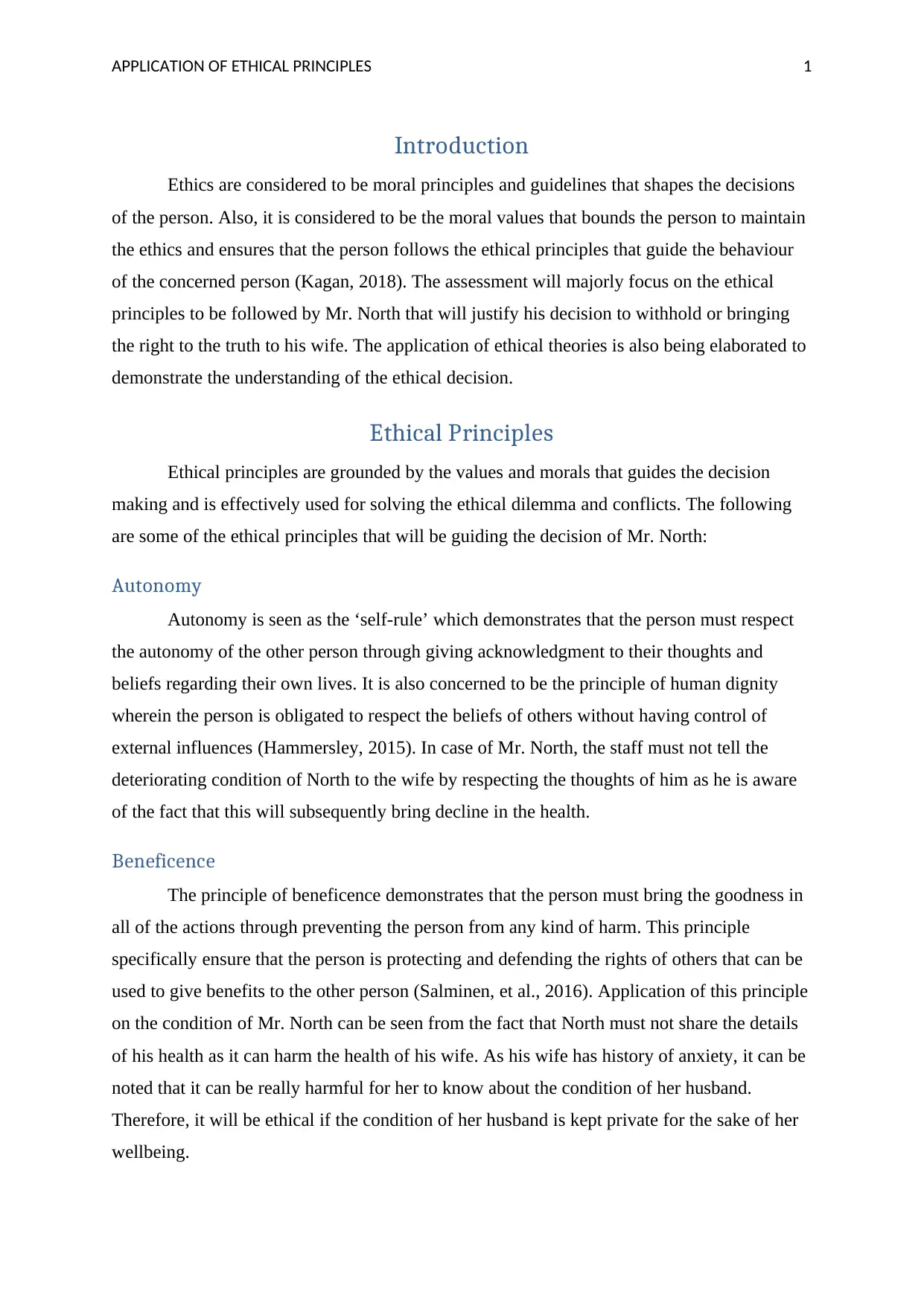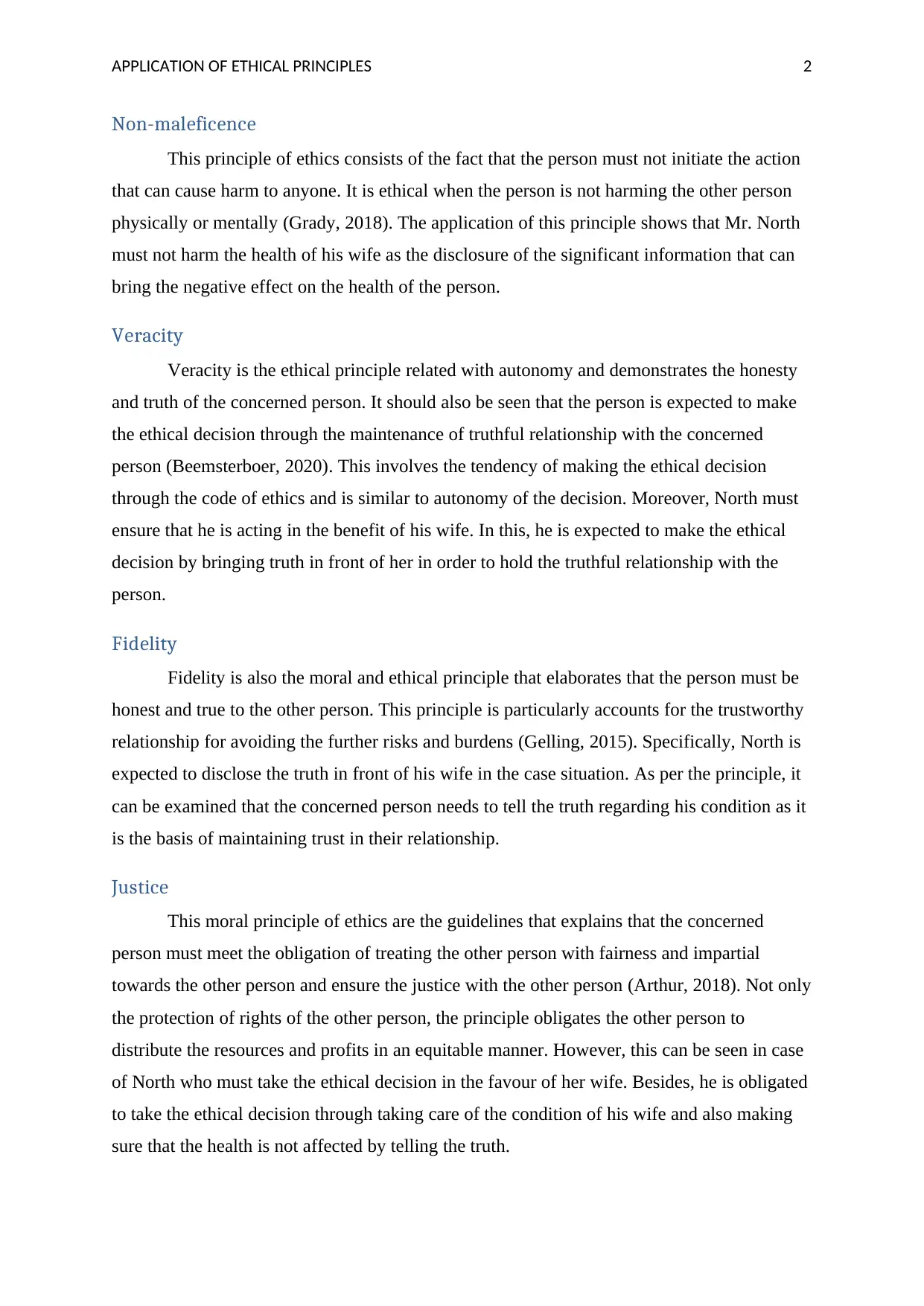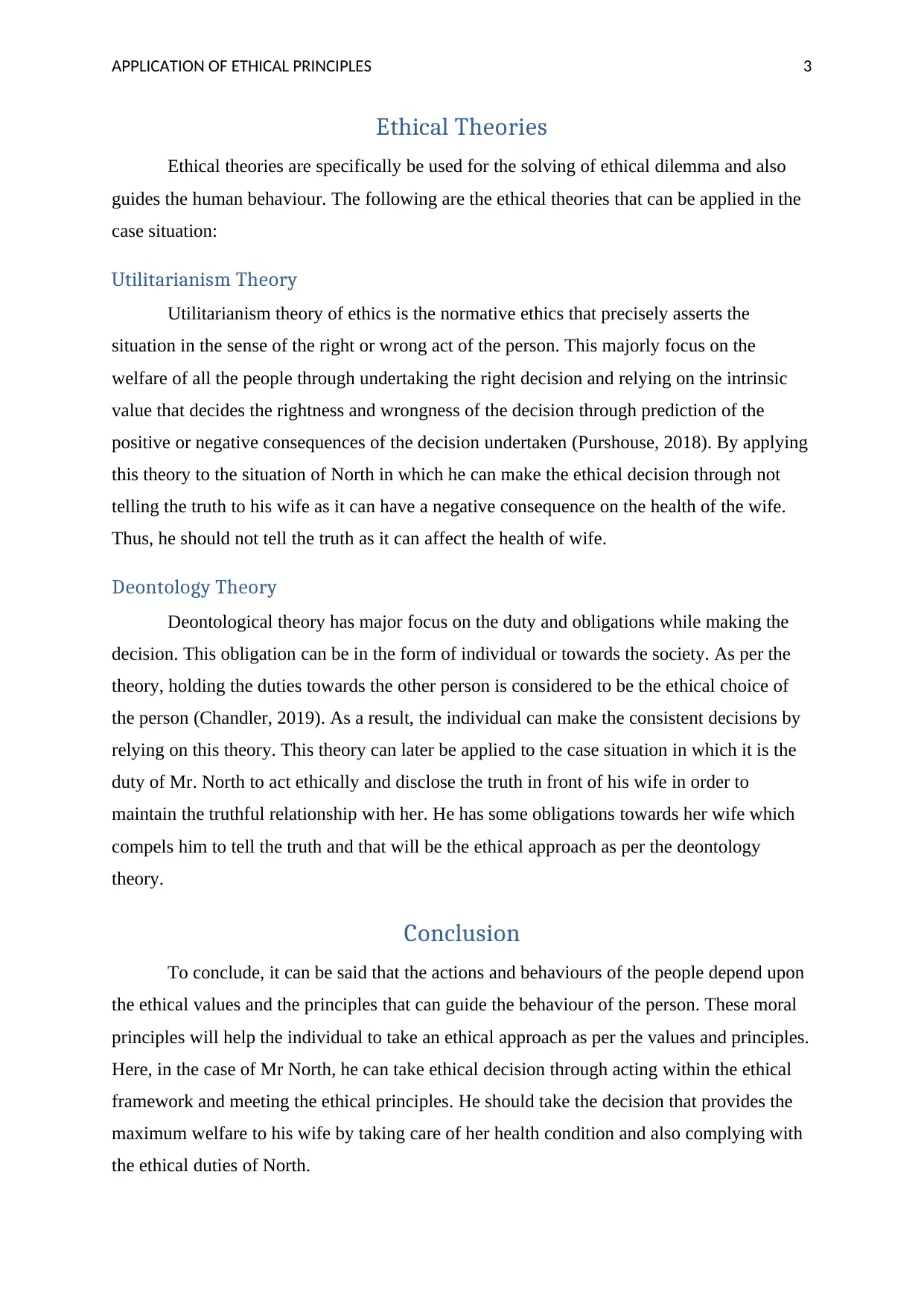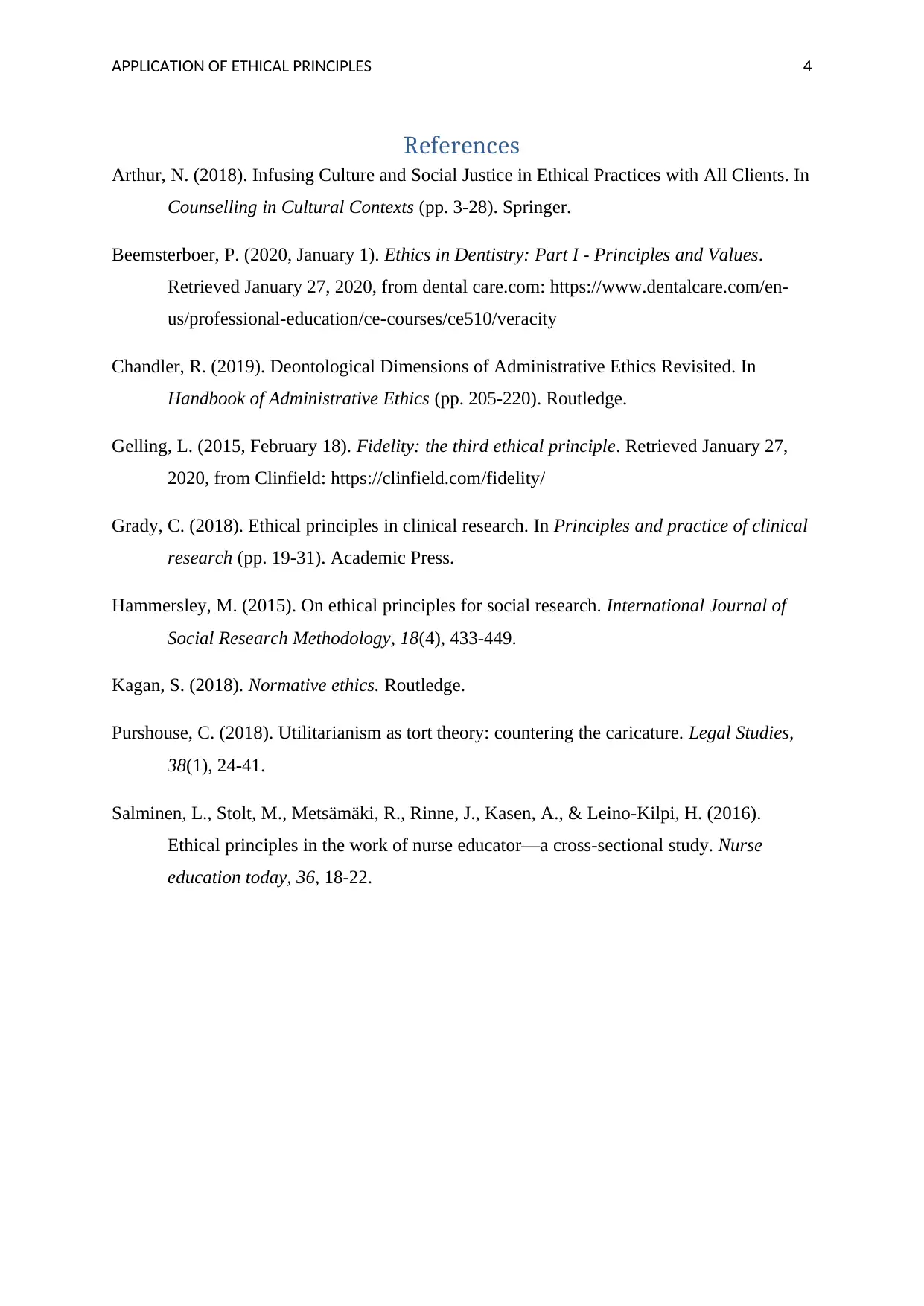Application of Ethical Principles | Assignment
VerifiedAdded on 2022/08/19
|5
|1561
|19
AI Summary
Contribute Materials
Your contribution can guide someone’s learning journey. Share your
documents today.

RUNNING HEAD: APPLICATION OF ETHICAL PRINCIPLES 0
2020
Ethical Principles
Student’s Details-
systemjp
2020
Ethical Principles
Student’s Details-
systemjp
Secure Best Marks with AI Grader
Need help grading? Try our AI Grader for instant feedback on your assignments.

APPLICATION OF ETHICAL PRINCIPLES 1
Introduction
Ethics are considered to be moral principles and guidelines that shapes the decisions
of the person. Also, it is considered to be the moral values that bounds the person to maintain
the ethics and ensures that the person follows the ethical principles that guide the behaviour
of the concerned person (Kagan, 2018). The assessment will majorly focus on the ethical
principles to be followed by Mr. North that will justify his decision to withhold or bringing
the right to the truth to his wife. The application of ethical theories is also being elaborated to
demonstrate the understanding of the ethical decision.
Ethical Principles
Ethical principles are grounded by the values and morals that guides the decision
making and is effectively used for solving the ethical dilemma and conflicts. The following
are some of the ethical principles that will be guiding the decision of Mr. North:
Autonomy
Autonomy is seen as the ‘self-rule’ which demonstrates that the person must respect
the autonomy of the other person through giving acknowledgment to their thoughts and
beliefs regarding their own lives. It is also concerned to be the principle of human dignity
wherein the person is obligated to respect the beliefs of others without having control of
external influences (Hammersley, 2015). In case of Mr. North, the staff must not tell the
deteriorating condition of North to the wife by respecting the thoughts of him as he is aware
of the fact that this will subsequently bring decline in the health.
Beneficence
The principle of beneficence demonstrates that the person must bring the goodness in
all of the actions through preventing the person from any kind of harm. This principle
specifically ensure that the person is protecting and defending the rights of others that can be
used to give benefits to the other person (Salminen, et al., 2016). Application of this principle
on the condition of Mr. North can be seen from the fact that North must not share the details
of his health as it can harm the health of his wife. As his wife has history of anxiety, it can be
noted that it can be really harmful for her to know about the condition of her husband.
Therefore, it will be ethical if the condition of her husband is kept private for the sake of her
wellbeing.
Introduction
Ethics are considered to be moral principles and guidelines that shapes the decisions
of the person. Also, it is considered to be the moral values that bounds the person to maintain
the ethics and ensures that the person follows the ethical principles that guide the behaviour
of the concerned person (Kagan, 2018). The assessment will majorly focus on the ethical
principles to be followed by Mr. North that will justify his decision to withhold or bringing
the right to the truth to his wife. The application of ethical theories is also being elaborated to
demonstrate the understanding of the ethical decision.
Ethical Principles
Ethical principles are grounded by the values and morals that guides the decision
making and is effectively used for solving the ethical dilemma and conflicts. The following
are some of the ethical principles that will be guiding the decision of Mr. North:
Autonomy
Autonomy is seen as the ‘self-rule’ which demonstrates that the person must respect
the autonomy of the other person through giving acknowledgment to their thoughts and
beliefs regarding their own lives. It is also concerned to be the principle of human dignity
wherein the person is obligated to respect the beliefs of others without having control of
external influences (Hammersley, 2015). In case of Mr. North, the staff must not tell the
deteriorating condition of North to the wife by respecting the thoughts of him as he is aware
of the fact that this will subsequently bring decline in the health.
Beneficence
The principle of beneficence demonstrates that the person must bring the goodness in
all of the actions through preventing the person from any kind of harm. This principle
specifically ensure that the person is protecting and defending the rights of others that can be
used to give benefits to the other person (Salminen, et al., 2016). Application of this principle
on the condition of Mr. North can be seen from the fact that North must not share the details
of his health as it can harm the health of his wife. As his wife has history of anxiety, it can be
noted that it can be really harmful for her to know about the condition of her husband.
Therefore, it will be ethical if the condition of her husband is kept private for the sake of her
wellbeing.

APPLICATION OF ETHICAL PRINCIPLES 2
Non-maleficence
This principle of ethics consists of the fact that the person must not initiate the action
that can cause harm to anyone. It is ethical when the person is not harming the other person
physically or mentally (Grady, 2018). The application of this principle shows that Mr. North
must not harm the health of his wife as the disclosure of the significant information that can
bring the negative effect on the health of the person.
Veracity
Veracity is the ethical principle related with autonomy and demonstrates the honesty
and truth of the concerned person. It should also be seen that the person is expected to make
the ethical decision through the maintenance of truthful relationship with the concerned
person (Beemsterboer, 2020). This involves the tendency of making the ethical decision
through the code of ethics and is similar to autonomy of the decision. Moreover, North must
ensure that he is acting in the benefit of his wife. In this, he is expected to make the ethical
decision by bringing truth in front of her in order to hold the truthful relationship with the
person.
Fidelity
Fidelity is also the moral and ethical principle that elaborates that the person must be
honest and true to the other person. This principle is particularly accounts for the trustworthy
relationship for avoiding the further risks and burdens (Gelling, 2015). Specifically, North is
expected to disclose the truth in front of his wife in the case situation. As per the principle, it
can be examined that the concerned person needs to tell the truth regarding his condition as it
is the basis of maintaining trust in their relationship.
Justice
This moral principle of ethics are the guidelines that explains that the concerned
person must meet the obligation of treating the other person with fairness and impartial
towards the other person and ensure the justice with the other person (Arthur, 2018). Not only
the protection of rights of the other person, the principle obligates the other person to
distribute the resources and profits in an equitable manner. However, this can be seen in case
of North who must take the ethical decision in the favour of her wife. Besides, he is obligated
to take the ethical decision through taking care of the condition of his wife and also making
sure that the health is not affected by telling the truth.
Non-maleficence
This principle of ethics consists of the fact that the person must not initiate the action
that can cause harm to anyone. It is ethical when the person is not harming the other person
physically or mentally (Grady, 2018). The application of this principle shows that Mr. North
must not harm the health of his wife as the disclosure of the significant information that can
bring the negative effect on the health of the person.
Veracity
Veracity is the ethical principle related with autonomy and demonstrates the honesty
and truth of the concerned person. It should also be seen that the person is expected to make
the ethical decision through the maintenance of truthful relationship with the concerned
person (Beemsterboer, 2020). This involves the tendency of making the ethical decision
through the code of ethics and is similar to autonomy of the decision. Moreover, North must
ensure that he is acting in the benefit of his wife. In this, he is expected to make the ethical
decision by bringing truth in front of her in order to hold the truthful relationship with the
person.
Fidelity
Fidelity is also the moral and ethical principle that elaborates that the person must be
honest and true to the other person. This principle is particularly accounts for the trustworthy
relationship for avoiding the further risks and burdens (Gelling, 2015). Specifically, North is
expected to disclose the truth in front of his wife in the case situation. As per the principle, it
can be examined that the concerned person needs to tell the truth regarding his condition as it
is the basis of maintaining trust in their relationship.
Justice
This moral principle of ethics are the guidelines that explains that the concerned
person must meet the obligation of treating the other person with fairness and impartial
towards the other person and ensure the justice with the other person (Arthur, 2018). Not only
the protection of rights of the other person, the principle obligates the other person to
distribute the resources and profits in an equitable manner. However, this can be seen in case
of North who must take the ethical decision in the favour of her wife. Besides, he is obligated
to take the ethical decision through taking care of the condition of his wife and also making
sure that the health is not affected by telling the truth.

APPLICATION OF ETHICAL PRINCIPLES 3
Ethical Theories
Ethical theories are specifically be used for the solving of ethical dilemma and also
guides the human behaviour. The following are the ethical theories that can be applied in the
case situation:
Utilitarianism Theory
Utilitarianism theory of ethics is the normative ethics that precisely asserts the
situation in the sense of the right or wrong act of the person. This majorly focus on the
welfare of all the people through undertaking the right decision and relying on the intrinsic
value that decides the rightness and wrongness of the decision through prediction of the
positive or negative consequences of the decision undertaken (Purshouse, 2018). By applying
this theory to the situation of North in which he can make the ethical decision through not
telling the truth to his wife as it can have a negative consequence on the health of the wife.
Thus, he should not tell the truth as it can affect the health of wife.
Deontology Theory
Deontological theory has major focus on the duty and obligations while making the
decision. This obligation can be in the form of individual or towards the society. As per the
theory, holding the duties towards the other person is considered to be the ethical choice of
the person (Chandler, 2019). As a result, the individual can make the consistent decisions by
relying on this theory. This theory can later be applied to the case situation in which it is the
duty of Mr. North to act ethically and disclose the truth in front of his wife in order to
maintain the truthful relationship with her. He has some obligations towards her wife which
compels him to tell the truth and that will be the ethical approach as per the deontology
theory.
Conclusion
To conclude, it can be said that the actions and behaviours of the people depend upon
the ethical values and the principles that can guide the behaviour of the person. These moral
principles will help the individual to take an ethical approach as per the values and principles.
Here, in the case of Mr North, he can take ethical decision through acting within the ethical
framework and meeting the ethical principles. He should take the decision that provides the
maximum welfare to his wife by taking care of her health condition and also complying with
the ethical duties of North.
Ethical Theories
Ethical theories are specifically be used for the solving of ethical dilemma and also
guides the human behaviour. The following are the ethical theories that can be applied in the
case situation:
Utilitarianism Theory
Utilitarianism theory of ethics is the normative ethics that precisely asserts the
situation in the sense of the right or wrong act of the person. This majorly focus on the
welfare of all the people through undertaking the right decision and relying on the intrinsic
value that decides the rightness and wrongness of the decision through prediction of the
positive or negative consequences of the decision undertaken (Purshouse, 2018). By applying
this theory to the situation of North in which he can make the ethical decision through not
telling the truth to his wife as it can have a negative consequence on the health of the wife.
Thus, he should not tell the truth as it can affect the health of wife.
Deontology Theory
Deontological theory has major focus on the duty and obligations while making the
decision. This obligation can be in the form of individual or towards the society. As per the
theory, holding the duties towards the other person is considered to be the ethical choice of
the person (Chandler, 2019). As a result, the individual can make the consistent decisions by
relying on this theory. This theory can later be applied to the case situation in which it is the
duty of Mr. North to act ethically and disclose the truth in front of his wife in order to
maintain the truthful relationship with her. He has some obligations towards her wife which
compels him to tell the truth and that will be the ethical approach as per the deontology
theory.
Conclusion
To conclude, it can be said that the actions and behaviours of the people depend upon
the ethical values and the principles that can guide the behaviour of the person. These moral
principles will help the individual to take an ethical approach as per the values and principles.
Here, in the case of Mr North, he can take ethical decision through acting within the ethical
framework and meeting the ethical principles. He should take the decision that provides the
maximum welfare to his wife by taking care of her health condition and also complying with
the ethical duties of North.
Secure Best Marks with AI Grader
Need help grading? Try our AI Grader for instant feedback on your assignments.

APPLICATION OF ETHICAL PRINCIPLES 4
References
Arthur, N. (2018). Infusing Culture and Social Justice in Ethical Practices with All Clients. In
Counselling in Cultural Contexts (pp. 3-28). Springer.
Beemsterboer, P. (2020, January 1). Ethics in Dentistry: Part I - Principles and Values.
Retrieved January 27, 2020, from dental care.com: https://www.dentalcare.com/en-
us/professional-education/ce-courses/ce510/veracity
Chandler, R. (2019). Deontological Dimensions of Administrative Ethics Revisited. In
Handbook of Administrative Ethics (pp. 205-220). Routledge.
Gelling, L. (2015, February 18). Fidelity: the third ethical principle. Retrieved January 27,
2020, from Clinfield: https://clinfield.com/fidelity/
Grady, C. (2018). Ethical principles in clinical research. In Principles and practice of clinical
research (pp. 19-31). Academic Press.
Hammersley, M. (2015). On ethical principles for social research. International Journal of
Social Research Methodology, 18(4), 433-449.
Kagan, S. (2018). Normative ethics. Routledge.
Purshouse, C. (2018). Utilitarianism as tort theory: countering the caricature. Legal Studies,
38(1), 24-41.
Salminen, L., Stolt, M., Metsämäki, R., Rinne, J., Kasen, A., & Leino-Kilpi, H. (2016).
Ethical principles in the work of nurse educator—a cross-sectional study. Nurse
education today, 36, 18-22.
References
Arthur, N. (2018). Infusing Culture and Social Justice in Ethical Practices with All Clients. In
Counselling in Cultural Contexts (pp. 3-28). Springer.
Beemsterboer, P. (2020, January 1). Ethics in Dentistry: Part I - Principles and Values.
Retrieved January 27, 2020, from dental care.com: https://www.dentalcare.com/en-
us/professional-education/ce-courses/ce510/veracity
Chandler, R. (2019). Deontological Dimensions of Administrative Ethics Revisited. In
Handbook of Administrative Ethics (pp. 205-220). Routledge.
Gelling, L. (2015, February 18). Fidelity: the third ethical principle. Retrieved January 27,
2020, from Clinfield: https://clinfield.com/fidelity/
Grady, C. (2018). Ethical principles in clinical research. In Principles and practice of clinical
research (pp. 19-31). Academic Press.
Hammersley, M. (2015). On ethical principles for social research. International Journal of
Social Research Methodology, 18(4), 433-449.
Kagan, S. (2018). Normative ethics. Routledge.
Purshouse, C. (2018). Utilitarianism as tort theory: countering the caricature. Legal Studies,
38(1), 24-41.
Salminen, L., Stolt, M., Metsämäki, R., Rinne, J., Kasen, A., & Leino-Kilpi, H. (2016).
Ethical principles in the work of nurse educator—a cross-sectional study. Nurse
education today, 36, 18-22.
1 out of 5
Related Documents
Your All-in-One AI-Powered Toolkit for Academic Success.
+13062052269
info@desklib.com
Available 24*7 on WhatsApp / Email
![[object Object]](/_next/static/media/star-bottom.7253800d.svg)
Unlock your academic potential
© 2024 | Zucol Services PVT LTD | All rights reserved.





